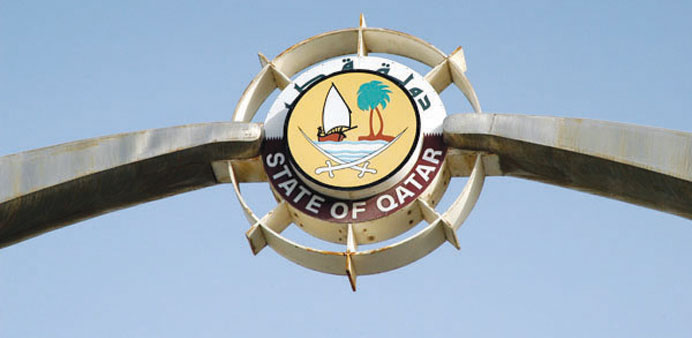
403
Sorry!!
Error! We're sorry, but the page you were looking for doesn't exist.
Qatar tops Mena in competitiveness
(MENAFN- Gulf Times) Qatar has moved up two places to secure the 14th position globally even as the country tops the Mena region in the latest 'Global Competitiveness Index' prepared by the World Economic Forum (WEF).
"Qatar leads the Middle East and North Africa region at 14th position," the WEF report said, adding the country's main strength is its "stable macroeconomic environment", which is driven by public budget surpluses and low government debt the result of high windfall revenues from energy exports.
But, the report said the recent decline in the price of oil and gas may undermine the country's performance in future. The 2015-2016 Global Competitiveness Report showed Qatar occupied the first position globally in terms of "ease of access to loans" and placed its stable macroeconomic environment in the second position, adding that businesses and individuals use latest technologies, including the Internet, widely.
Additional strengths include high efficiency in goods and services markets (fifth) and a very high level of physical security (fourth), the report said.
"To maintain its strong position, Qatar will have to invest its exceptional wealth in the types of innovation and transfer of technology and know-how that can translate into future economic growth.
"Currently, government procurement plays a key role in promoting innovation (first on government procurement of advanced technology products). With imports standing at 30.77% of GDP, promoting inward trade and investment could contribute to bringing in new technologies and know-how and enhancing a culture of innovation," the report said.
Meanwhile, the first place in the GCI rankings was bagged by Switzerland, for the seventh consecutive year.
Its strong performance in all the 12 pillars of the index explains its remarkable resilience throughout the crisis and subsequent shocks. Singapore remains in second place and the US third.
Germany improves by one place to fourth and the Netherlands returns to the fifth place it held three years ago. Japan (6) and Hong Kong (7) follow, both stable.
Finland falls to eighth place € its lowest position ever € followed by Sweden (9).
The UK rounds up the top 10 of the most competitive economies in the world.
The Global Competitiveness Report's competitiveness ranking is based on the GCI, which was introduced by the World Economic Forum in 2004.
Defining competitiveness as the set of institutions, policies and factors that determine the level of productivity of a country, GCI scores are calculated by drawing together country-level data covering 12 categories € the pillars of competitiveness € that collectively make up a comprehensive picture of a country's competitiveness.
The 12 pillars are institutions, infrastructure, macroeconomic environment, health and primary education, higher education and training, goods market efficiency, labour market efficiency, financial market development, technological readiness, market size, business sophistication, and innovation.
"Qatar leads the Middle East and North Africa region at 14th position," the WEF report said, adding the country's main strength is its "stable macroeconomic environment", which is driven by public budget surpluses and low government debt the result of high windfall revenues from energy exports.
But, the report said the recent decline in the price of oil and gas may undermine the country's performance in future. The 2015-2016 Global Competitiveness Report showed Qatar occupied the first position globally in terms of "ease of access to loans" and placed its stable macroeconomic environment in the second position, adding that businesses and individuals use latest technologies, including the Internet, widely.
Additional strengths include high efficiency in goods and services markets (fifth) and a very high level of physical security (fourth), the report said.
"To maintain its strong position, Qatar will have to invest its exceptional wealth in the types of innovation and transfer of technology and know-how that can translate into future economic growth.
"Currently, government procurement plays a key role in promoting innovation (first on government procurement of advanced technology products). With imports standing at 30.77% of GDP, promoting inward trade and investment could contribute to bringing in new technologies and know-how and enhancing a culture of innovation," the report said.
Meanwhile, the first place in the GCI rankings was bagged by Switzerland, for the seventh consecutive year.
Its strong performance in all the 12 pillars of the index explains its remarkable resilience throughout the crisis and subsequent shocks. Singapore remains in second place and the US third.
Germany improves by one place to fourth and the Netherlands returns to the fifth place it held three years ago. Japan (6) and Hong Kong (7) follow, both stable.
Finland falls to eighth place € its lowest position ever € followed by Sweden (9).
The UK rounds up the top 10 of the most competitive economies in the world.
The Global Competitiveness Report's competitiveness ranking is based on the GCI, which was introduced by the World Economic Forum in 2004.
Defining competitiveness as the set of institutions, policies and factors that determine the level of productivity of a country, GCI scores are calculated by drawing together country-level data covering 12 categories € the pillars of competitiveness € that collectively make up a comprehensive picture of a country's competitiveness.
The 12 pillars are institutions, infrastructure, macroeconomic environment, health and primary education, higher education and training, goods market efficiency, labour market efficiency, financial market development, technological readiness, market size, business sophistication, and innovation.

Legal Disclaimer:
MENAFN provides the
information “as is” without warranty of any kind. We do not accept
any responsibility or liability for the accuracy, content, images,
videos, licenses, completeness, legality, or reliability of the information
contained in this article. If you have any complaints or copyright
issues related to this article, kindly contact the provider above.


















Comments
No comment